Like any other kid, Rorelyn, an 18-year-old Lumad girl from the Manobo tribe, goes on her phone to browse the internet during her free time. Her favorite colors are red and pink. She likes reading. She gets irritated by traffic. She loves joking around with her friends. She could have been any other teenager you and I know.
Unlike any other kid, she was separated from her family at a tender age and flown out to the other side of the country for safety. She survived a school shooting. She was chased in the night by armed men who don’t seem to care that she’s a child—all they cared about was that she was a Lumad.
I asked her if this was her normal. She said yes. Rorelyn, and most of the Lumad youth, are not at all regular kids.
“Ang dami pang kabataan tulad namin na hindi pa nakararanas ng edukasyon. ‘Di pa nga sila nakakikita ng siyudad, ng ibang tao. Nakikita lang nila yung mga hayop sa bundok,” Rorelyn told me. Her school was one of the 55 Lumad schools that were closed down in the past month. She now continues her education in Metro Manila as a student in a ‘bakwit’ school. Bakwit is jargon for evacuate.
I asked her what studying in a bakwit school was like. “Hindi siya as in school na ganyan,” she points to the University of the Philippines Diliman’s College of Business Administration. We were in the middle of our hour-long conversation on a nondescript bench in the Sunken Garden. Bakwit schools are mobile schools for the Lumad youth, borne out of need as the Lumads are continuously being driven out of their ancestral lands through violence.
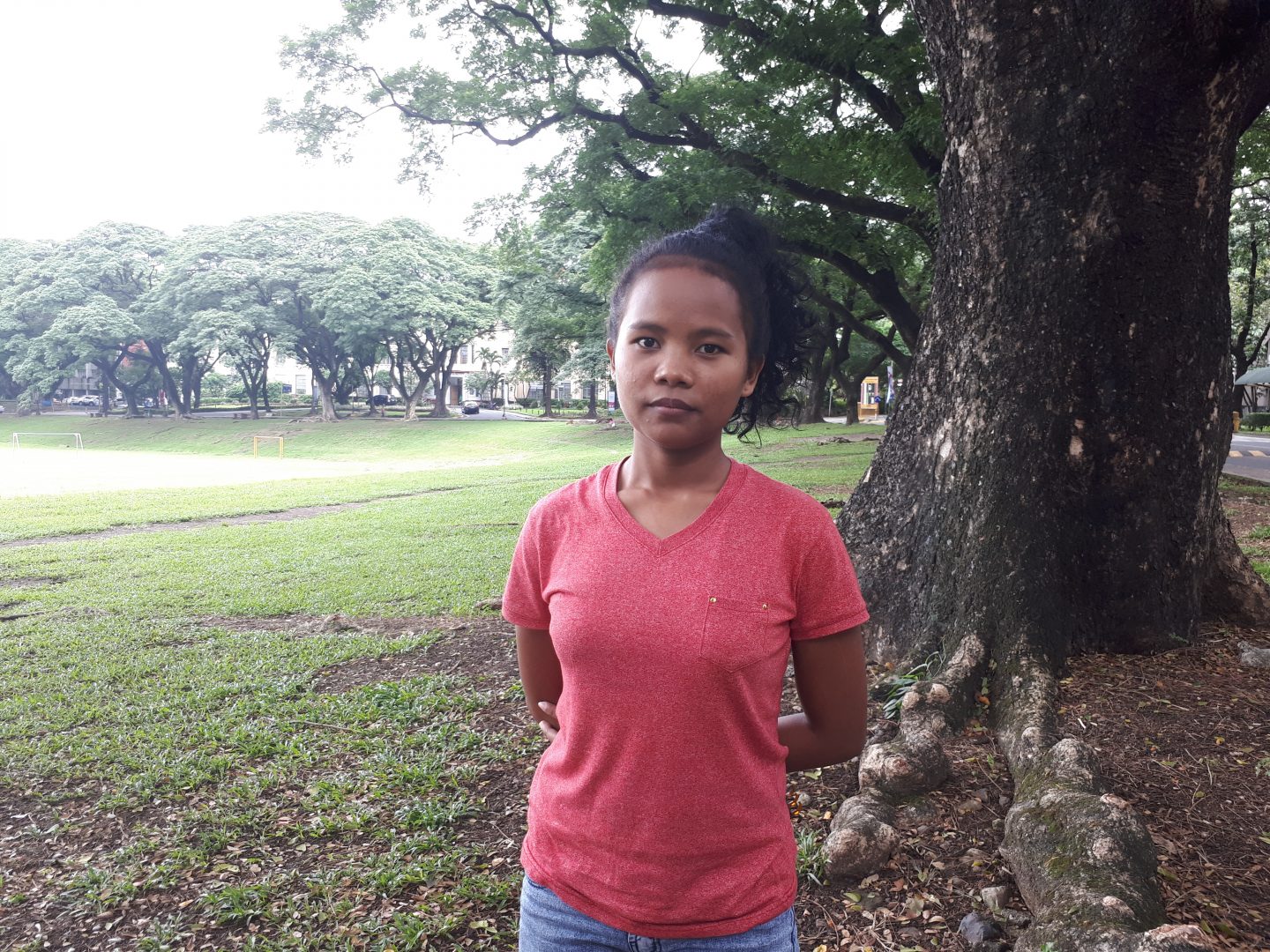
Rorelyn, 18, recounts her story before arriving in Manila.
Rorelyn’s bakwit school is currently being hosted by the University of the Philippines. That was their routine in the metro: Study for a few weeks in a university willing to host them, and then move on to the next. “Parang hindi na bago sa amin yung palipat-lipat ng school. Hindi kami sanay sa lugar, lalong lalo na sa klima, sa temperatura, sa pollu-(stops and laughs), sa mga pagkain, pero tiniis po namin yan.” This is how Rorelyn, her classmates and their volunteer teachers keep afloat.
In bakwit schools, the students also join rallies regularly. When Rorelyn isn’t studying, she’s out telling her story. “Para ipakita na lumalaban talaga kami,” she says. “Yung paniniwala namin, mas matalino ka kapag alam mo yung nangyayari sa lipunan mo.” This isn’t unusual, since Lumad schools are rooted in revolution since its conception. They were first established to take a stand and stake the Lumads’ claim against outsiders threatening to mine the Lumads’ ancestral lands—the 8.1 million-hectare Pantarong Mountain Range.
In 2003 to 2007, the Lumad schools were officially accredited by the DepEd as alternative or formal Indigenous People (IP) schools. There are two kinds: The formal schools which follow the K-12 curriculum and the Alternative Lumad Schools (ALS) which aren’t required to follow it. Both, however, still have the same goal: To “mold nationalist, scientific and people oriented indigenous children who [are] equipped with knowledge on human rights, environmental protection, development of culture and community and defense of ancestral land,” according to the Lumad Bakwit School.
In ALS, young Lumads are also taught special technical subjects necessary in their day-to-day culture. They are taught sustainable agriculture and animal husbandry because this is their primary livelihood, health since they’re far from hospitals, and leadership, to mention a few.
In the same years these schools were legally established, the shootings and attacks also began.
“Kasi iniisip ko, kung hindi kami magsasalita, sinong magsasalita para sa amin?”
To an outsider, it all seems like a tall order for an 18-year-old. On Rorelyn’s shoulders lies the weight of her land, her tribe, her ancestors’ fight. Despite the struggle, she always seems to find the strength to say okay lang. Even recounting her story—which caused her extreme trauma—is hard, especially when you have to do it countless times. I ask her what pushes her to keep telling it. “Kasi iniisip ko, kung hindi kami magsasalita, sinong magsasalita para sa amin? Hindi nila alam ‘yung kwento namin, kung bakit kami napunta rito sa Maynila, bakit palagi kaming sumisigaw,” Rorelyn replies.
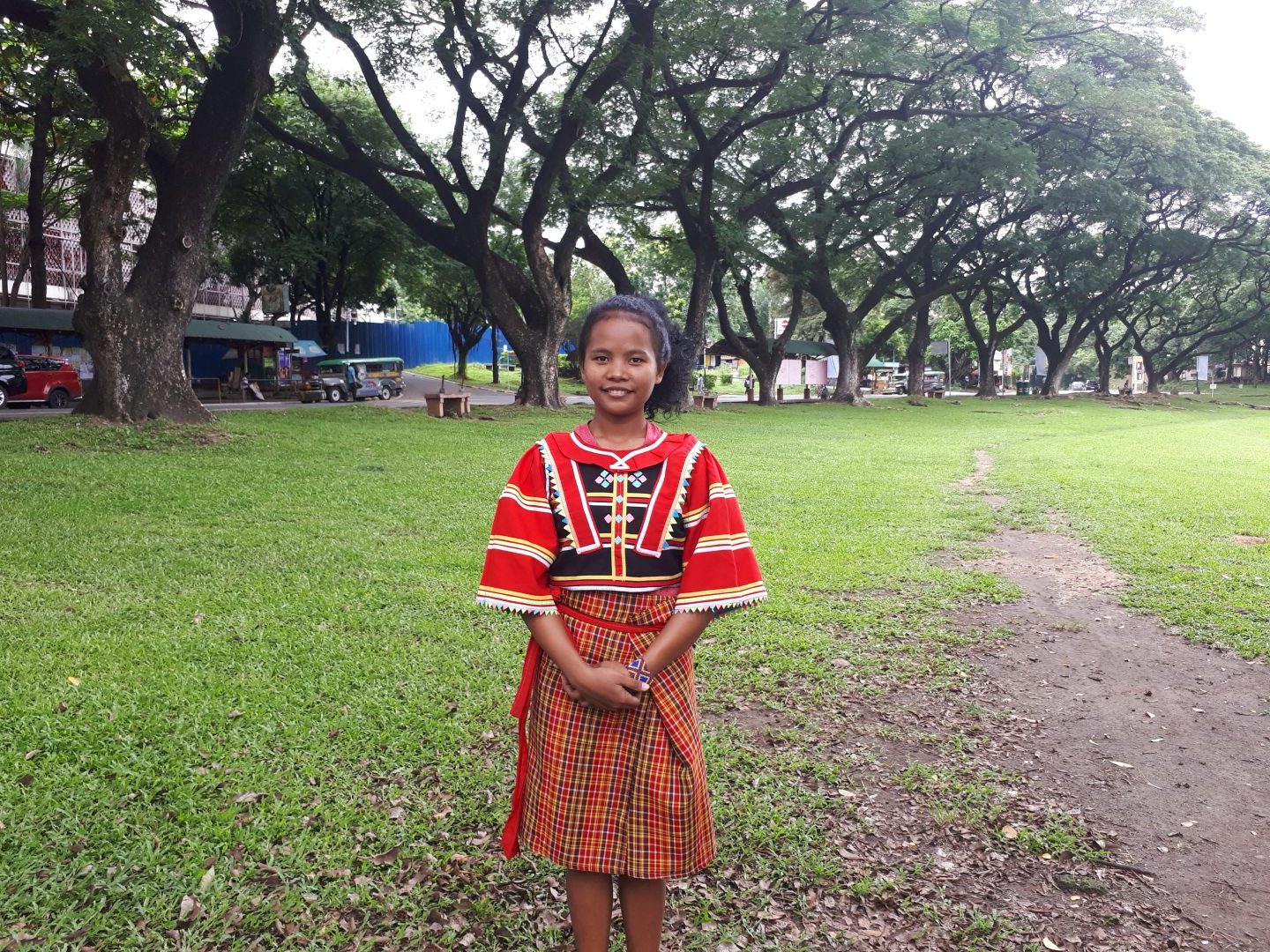
Rorelyn wears her traditional clothing
It makes me think: Why are the Lumads, who make up around 18 percent of the country’s population and are supposedly protected as IPs, being treated like pests? President Duterte once said that he swore to protect and uphold the rights of “all Filipinos.” Why does that seem to exclude the Lumads, who are being bombed and put on a chokehold by guns, violence, and Martial Law?
President Duterte once said that he swore to protect and uphold the rights of “all Filipinos.” Why does that seem to exclude the Lumads, who are being bombed and put on a chokehold by guns, violence, and Martial Law?
Bright young minds like Rorelyn deserve their human right to get education. They do not deserve to be shot at in the middle of a class, using only books for protection. No child does. They also deserve a government that respects the IPs traditions and ancestral claims. In my conversation with Rorelyn, we learn about the story of one Lumad child—one that is filled with blood and injustice. Unfortunately, Rorelyn’s isn’t the only story out there like it.
Pwede ka ba magpakilala?
Ako si Rorelyn. 18 years old. Grade 12, nag-aaral sa Lumad school. Ako’y isang Lumad, partikular sa tribong Manobo sa Talaingod, Davao Del Norte.
Paano kayo nakarating dito sa Maynila?
Kasi ‘yung komunidad namin nag-bakwit kami sa Davao City sa evacuation center. Tapos pumunta kami dito, nag-eroplano, pero kahit sa airplane, merong mga DSWD kasi mga minor age pa raw kami, pero may mga parent’s consent naman.
DSWD? Ine-escort kayo o pinipigilan kayo?
Oo, pinipigilan kasi mag-ra-rally daw kami, ganon. Bago po kasi kami nakarating dito, one night hinabol kami tapos nag-bakwit kami sa madaling araw. 9 p.m. [kami umalis], nakarating kami sa ibang komunidad mga 12 a.m. na, tapos nag-ride kami hanggang sa parang barangay namin tapos sasakay ng bus, kasi hinahabol kami.
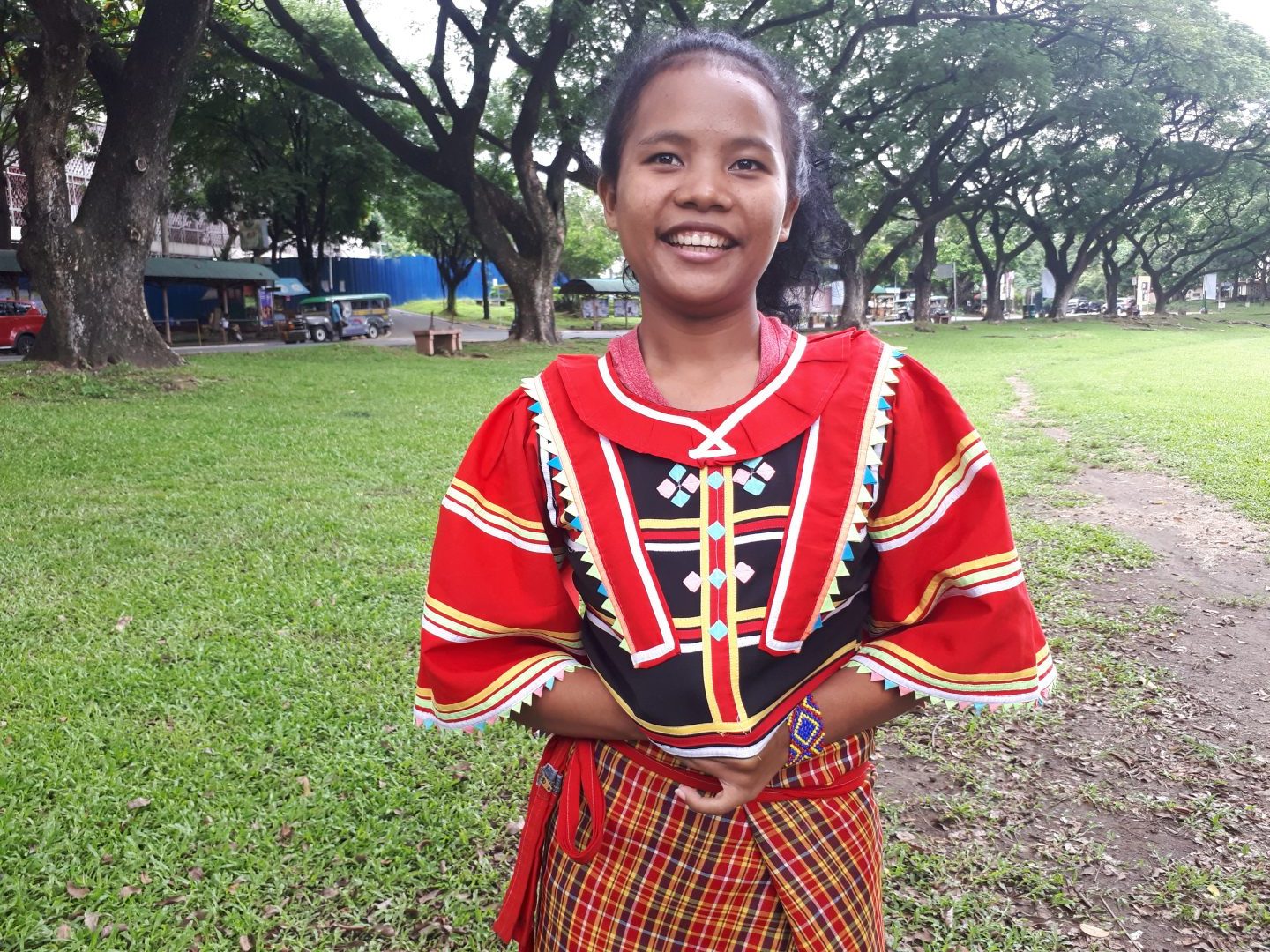
Rorelyn smiles as she tells stories about her community’s traditions
Bakit kayo hinahabol?
‘Yung school daw namin ay paaralan ng NPA, tuta raw ng NPA. Pero sa katunayan naman, ‘di siya totoo. Parang gusto lang talaga nila sirain ‘yung Lumad schools. ‘Yung turing kasi nila sa amin parang wala lang. Walang pinag-aralan. Basta mga Lumad, walang kwenta. Mga bobo.
Sinasabihan kayo ng ganon nang diretso?
Oo, dire-diretso.
Ano nararamdaman mo kapag kinekwento mo ‘yung mga mahihirap na parte? Parang napakahirap niya.
Ang hirap ikwento! Sobrang hirap, pero kinakaya ko. Iniisip ko kasi ‘yung mga ancestor namin dinedepensahan talaga nila ‘yung lupang ninuno. Eh kung sa aming henerasyon hindi namin dedepensahan, paano na ‘yung susunod na henerasyon? Paano na ‘yung mga anak namin, mga anak ng anak namin? ‘Yun ‘yung iniisip ko. Pati kung paano ipreserba ‘yung kultura. Kasi unti-unti na siyang nawawala.
“Iniisip ko kasi ‘yung mga ancestor namin dinedepensahan talaga nila ‘yung lupang ninuno. Eh kung sa aming henerasyon hindi namin dedepensahan, paano na ‘yung susunod na henerasyon? Paano na ‘yung mga anak namin, mga anak ng anak namin?”
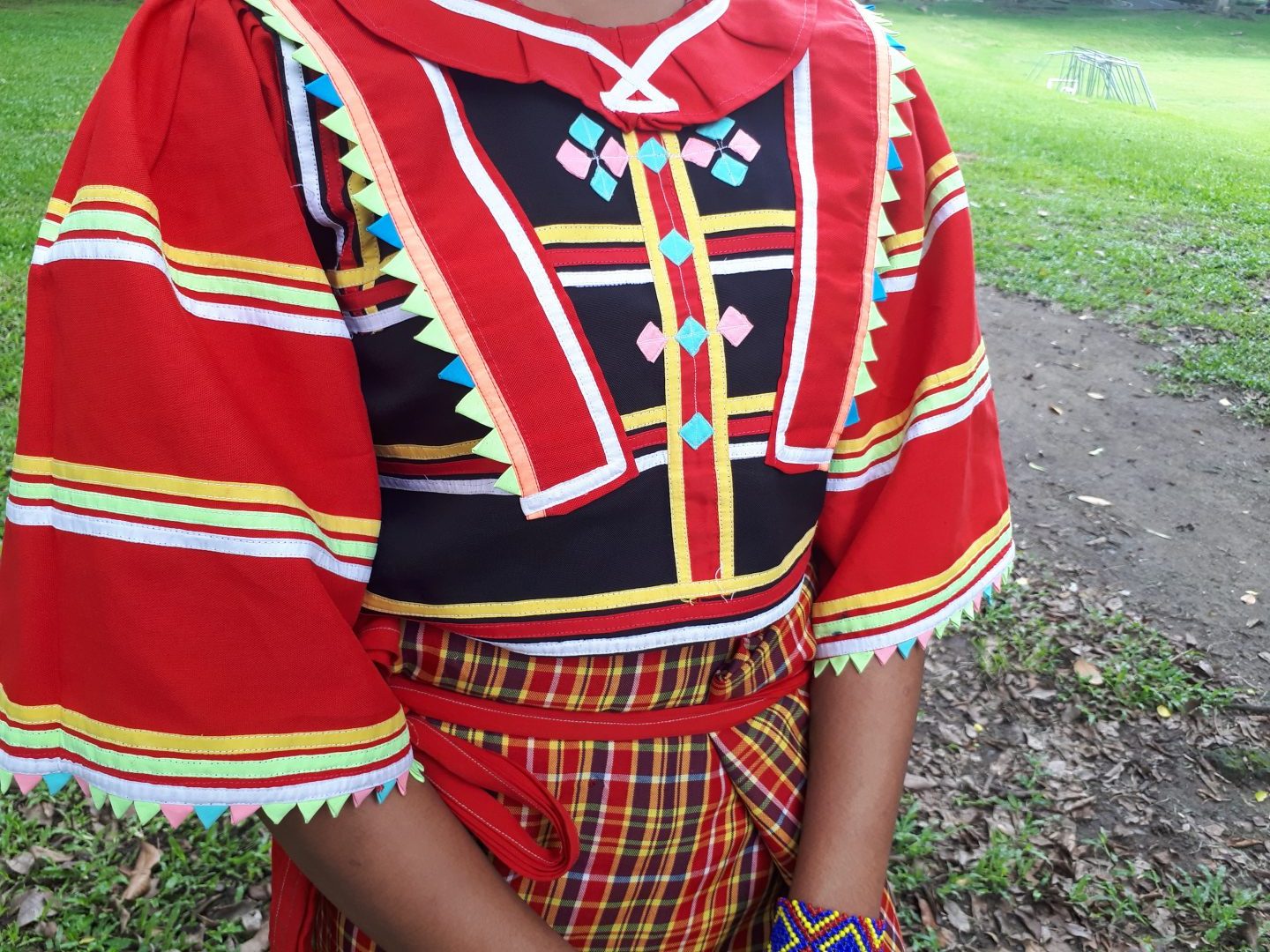
Traditional Monobo clothes typically used in special ceremonies like weddings
Ano ‘yung pinaka nakakatakot mong naranasan?
‘Yung binaril ‘yung [school namin] nung Jun. 23, 2017. Binaril ‘yung paaralan namin habang kami ay nagkaklase. Nag-aaral kami nun. ‘Yung hawak ko libro ng linangang Pilipino, tapos nagbabasa ako kasi sabi ng teacher namin, “Get one sheet of 1/4th paper.” ‘Edi nag-study na ako, tapos biglang nagsimula yung putukan.
Alam mo ‘yung out of mind ka, parang nawala ka sa sarili. Tapos tinitingnan ko lang ‘yung nangyayari, ‘yung mga kapatid ko, mga pinsan ko, hinahawakan na nila ako. Parang nawala ‘yung kaluluwa ko sa eksena. ‘Yun ay nagbunga sa akin ng trauma.
Basta ‘yung ‘di ko makakalimutan na karanasan ko ay ‘yung nag-bakwit kami tapos hinabol kami ng mga sundalo. ‘Yung paligid ng bahay namin may mga flashlight na. Kung sasakay kami ng motor, maraming checkpoint. ‘Yung mga tao sa community [sinasabihan kami], “Sige umalis na kayo! Umalis na kayo kasi andito na!” Edi nag-bakwit na kami kasama ‘yung tatay ko. Dala-dala niya ‘yung bangkaw (spear) kasi wala kaming baril, atsaka pana. ‘Yun lang dala ng tatay ko. Ang dala ko lang bag.
“Sabi ko, ayaw ko na. Bakit ganito ang mundo? Ayoko na mabuhay. Pero kailangan. Kasi nakasalalay sa’min ‘yung mga pangarap ng tribo, ng komunidad.”
Noon, malapit na ‘yung graduation ng grade 10. Pagdating ko [sa siyudad], graduation na. Nakikita ko ‘yung mga kaklase ko kumpleto sila, may nanay at tatay sila. Samantalang ako, wala. Ako pa naman ‘yung mangunguna sa taong ‘yon.
Magmamartsa kami tapos ang saya-saya nila. Samantalang ako, wala ‘yung nanay ko, wala ‘yung tatay ko kasi naiwan sila nasa evacuation center. Naglalakad na’ko sa stage kasi magdedeliver na ng speech, tapos iyak na ako nang iyak. Sinong magsasabit sa akin ng medalya? Pinaghirapan ko pa naman ‘yon kasi ‘yung inspirasyon ko sa pag-aaral ko ‘yung mga magulang ko.
Pagdating ng alas tres ng hapon, may putukan na naman. Nag-bakwit na naman kami. ‘Yung ilog pa nun bumaha, tapos yung mga tsinelas ko, nalunod. Tinangay ng baha. Ang sakit. Sabi ko, ayaw ko na. Bakit ganito ang mundo? Ayoko na mabuhay—pero kailangan. Nakasalalay sa’min ‘yung mga pangarap ng tribo, ng komunidad. Parang kahit ayaw mo na, pipilitin mo pang lumaban. Ito y’ung nagtulak sa ‘kin kung bakit okay lang na malayo sa pamilya, sa komunidad. Kahit hinahanap na ako ngayon. Sabi lang nila, “Mag-ingat ka.”
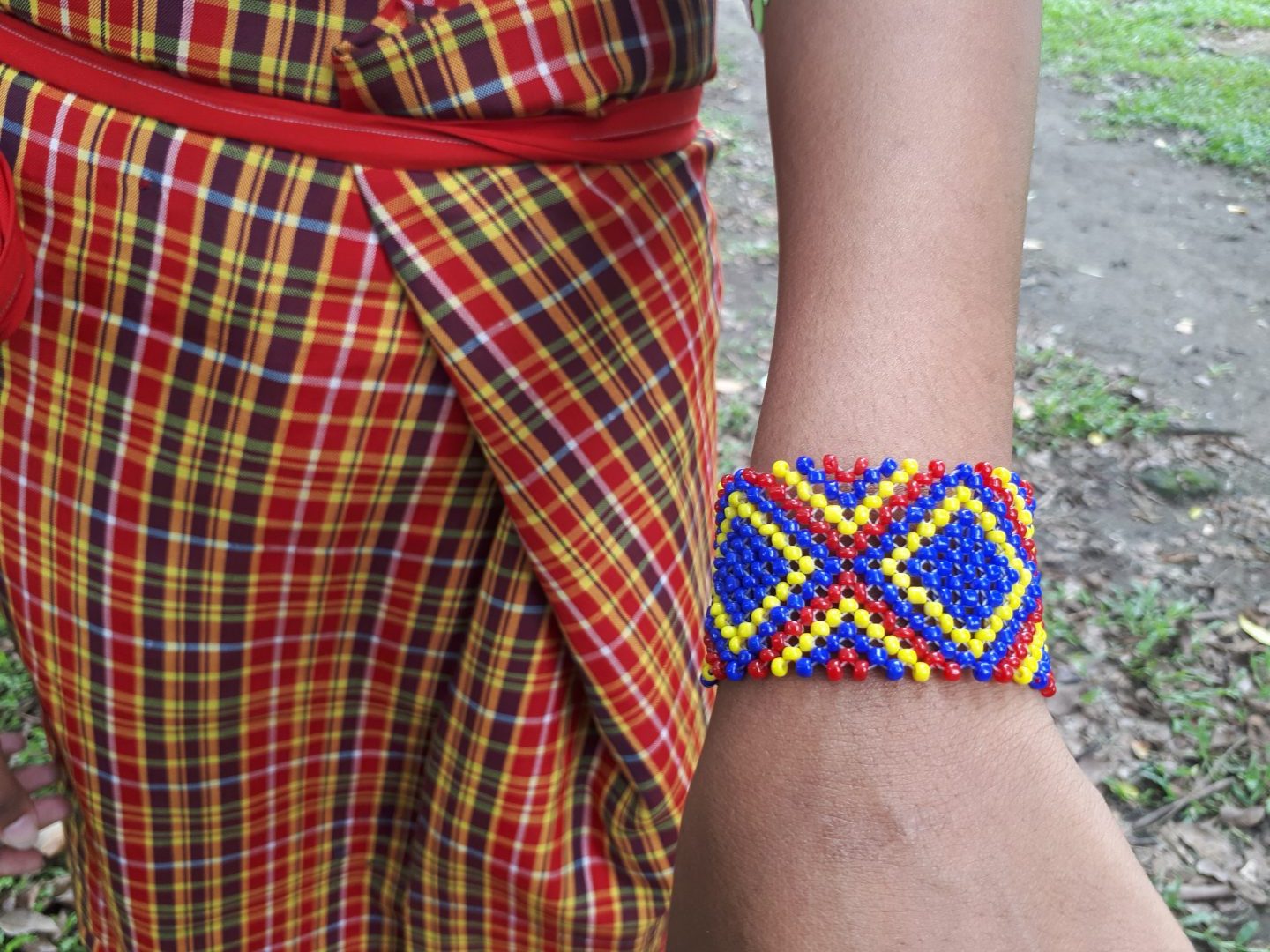
Rorelyn did the beading of the bracelet herself, using her tribe’s traditional pattern
Anong gusto niyong marating sa pagpaaalam niyo ng kwento niyo dito?
Ang gusto talaga namin na mangyari ay ‘di mapasara ‘yung Lumad schools. Madami sanang mag-volunteer na mga teachers. At lalong-lalo na, sana marami ang makikinig sa amin. Gusto namin maparating ‘yung mga panawagan namin, tapos makabalik na kami sa aming komunidad. ‘Di na kami mag-bakwit. Itigil na ‘yung Martial Law sa Mindanao.
Kasi sabi nila, makakabuti daw yung Martial Law kasi ligtas daw, ‘eh paano kami? Hindi nga kami ligtas. Pinalayas pa nga kami sa aming mga mismong komunidad na ang tumira na ngayon mga sundalo. Tapos i-pull out na talaga ‘yung militar. Pakinggan ni Duterte kung ano ‘yung panawagan namin.. Tutulong daw siya sa amin kapag mananalo siya. Sila daw mismo ang maghahatid sa amin sa aming komunidad. Pero ngayon, siya pa ang nagsasabi na bobombahin niya yung Lumad schools.
“Ang gusto ko mangyari, ang lahat din ng mga kabataan maging katulad namin na alam ‘yung nangyayari sa lipunan. Alam namin ‘yung dapat naming gawin.”
Paano ba makakatulong ang mga kabataan ngayon?
Ang gusto ko mangyari, lahat ‘din ng mga kabataan maging katulad namin na alam ‘yung nangyayari sa lipunan. Alam namin ‘yung dapat naming gawin. ‘Yung basic talaga nun ay sumasama sa rallies o kung may mga educational discussion dapat makinig sila, ganon. The best talaga ay alamin nila kung ano ang tunay na kalagayan ng mga basic sectors ng mga manggagawa, magsasaka, katutubo, at Lumad.
Header art by Renz Mart Reyes
Photos by Giselle Barrientos


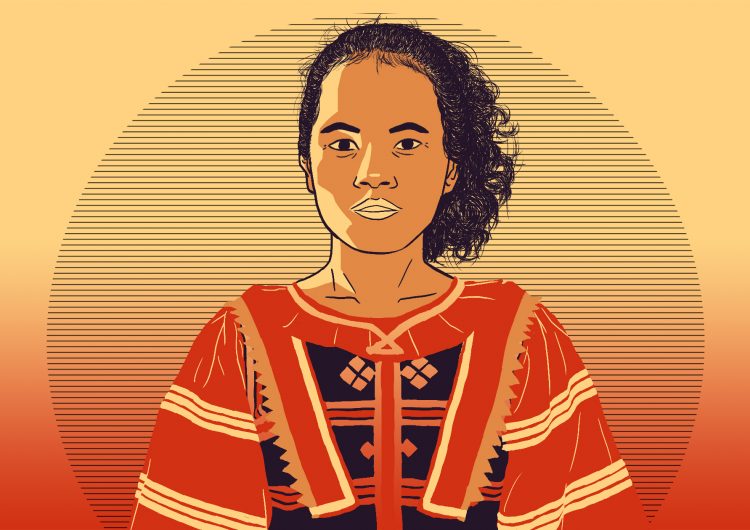













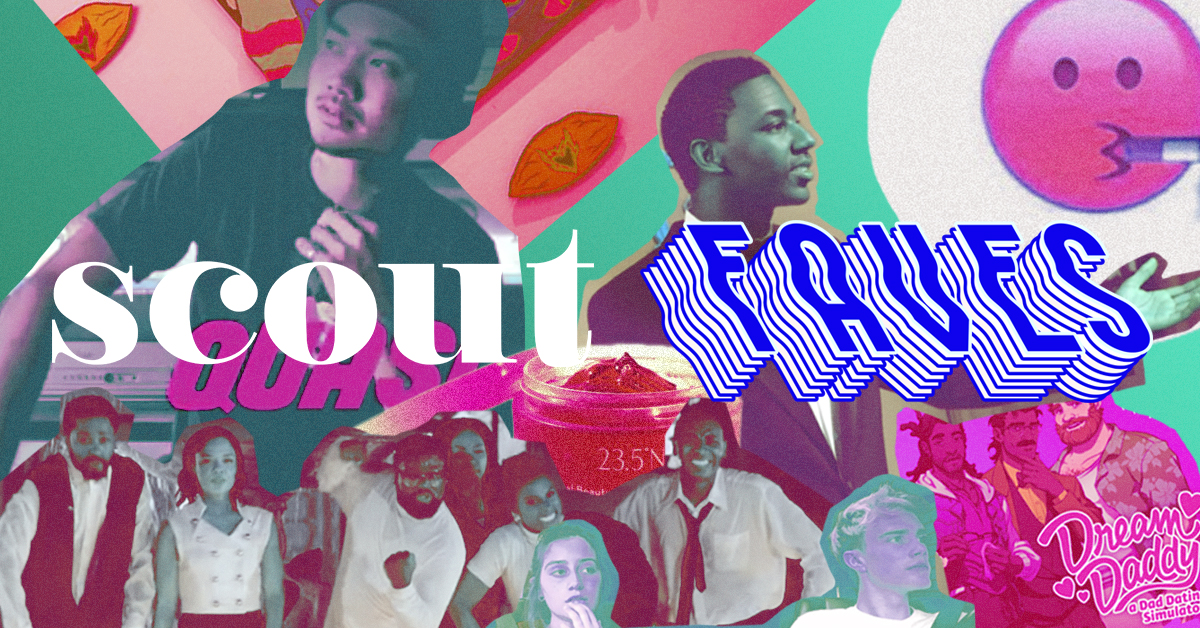

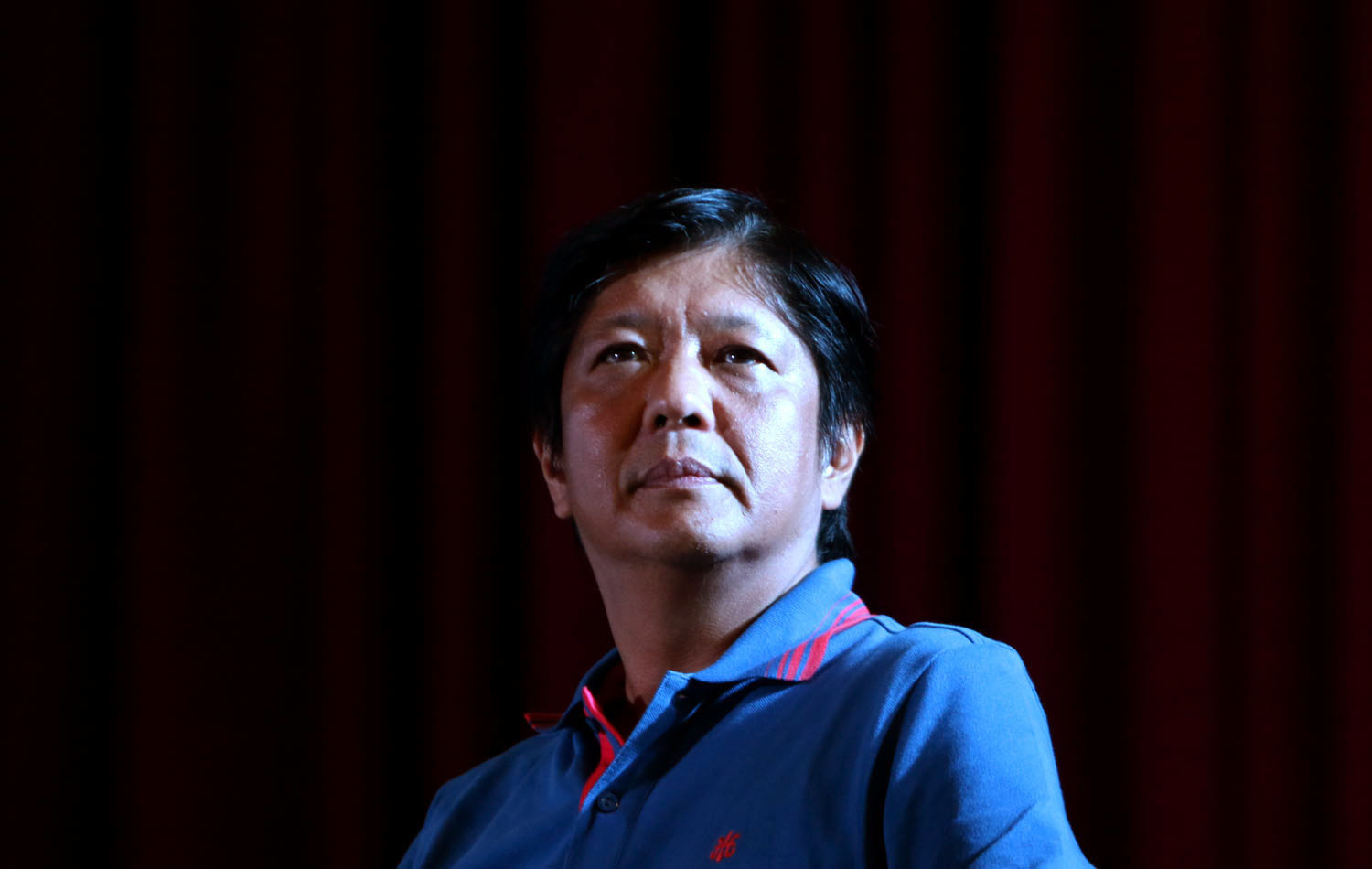






Comments